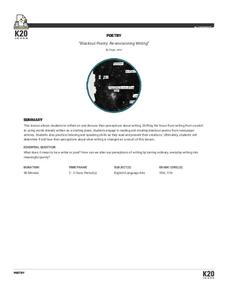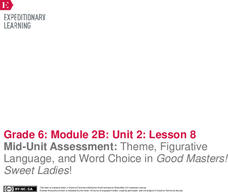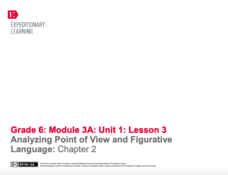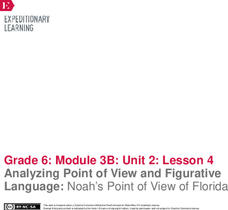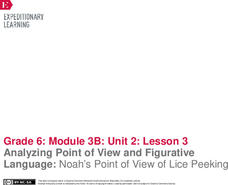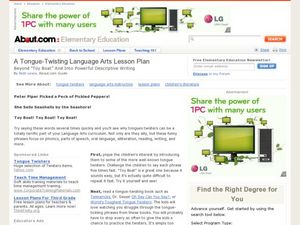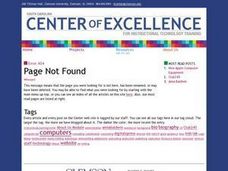K20 Learn
Blackout Poetry: Re-Envisioning Writing
New ReviewShed light on the beauty of language with a great poetry activity. After learning about Austin Kleon's blackout poetry model, pupils respond to some of his poetry and use it as a model to produce their own. Young writers also share their...
Curated OER
Formal versus Informal Language
Engage in an activity that focuses on the concepts of formal and informal language use. Middle and high schoolers compare and contrast each style by using a Venn diagram that includes some examples. They read and hear a passage of lyrics...
English Enhanced Scope and Sequence
Differentiate between Formal and Informal Language
The Pledge of Allegiance, the Gettysburg Address, the National Anthem, and the Preamble to the Constitution all get close attention in an exercise that asks learners to rewrite these formally-worded documents into informal language....
Curated OER
Figurative Language
What is figurative language, and why do we use it? Introduce your high schoolers to some examples and discuss the importance of including this element in your writing. After studying a text and searching for examples, writers will...
EngageNY
Grade 9 ELA Module 2, Unit 2, Lesson 3
The manipulation of time is one of the most essential elements in Sophocles' Oedipus the King. As your language arts class participates in a jigsaw discussion activity, they work together to analyze the play's plot structure and...
Curated OER
Cartoon Stories
All ages love to engage in cartoon writing –- little do they know that they actually learn quite a bit from it! In an instructional session focused on literacy syntax and vocabulary, your pupils work cooperatively to draw six pictures...
Curated OER
Figurative and literal language through the study of Shakespeare
Sixth graders explore figurative and literal language. They study literary devices through short pieces of Shakespeare's work. Then investigate Shakespeare's works and life.
Curated OER
Fall Similes
Fall is like a beautiful painting come to life—or is it more like an overflowing cornucopia? Practice writing similes with a lesson on figurative language. As learners review simile structure, they come up with their favorite similes for...
EngageNY
Mid-Unit Assessment: Theme, Figurative Language, and Word Choice in Good Masters! Sweet Ladies!
Time to show what you know. Scholars complete a mid-unit assessment to demonstrate their learning from the past lessons. Learners work independently to identify the theme and answer questions about Pask, the Runaway. They also examine...
EngageNY
Analyzing Point of View and Figurative Language: Chapter 2
Just get to the gist. Scholars work in pairs to find the gist of an excerpt from Laurence Yep's Dragonwings. Pupils also complete graphic organizers to analyze the text for tone, point of view, and figurative language.
EngageNY
Analyzing Point of View and Figurative Language: Chapter 3
Get to the point ... the point of view, that is! Pupils analyze Laurence Yep's Dragonwings for tone, figurative language, and point of view by completing graphic organizers. Scholars also read an excerpt from the novel and record the...
EngageNY
Analyzing Point of View and Figurative Language: Noah’s Point of View of Florida
Fishing for words. Scholars search for unfamiliar words in pages 27-29 of Flush, place them in their word catchers, and complete part of Noah’s Point of View graphic organizer. After identifying figurative language, learners analyze tone...
EngageNY
Analyzing Point of View and Figurative Language: Noah’s Point of View of Lice Peeking
Read along with me. Two learners read the parts of Noah and Lice in Flush as the rest of the class follows along. Readers look for unfamiliar words and the use of figurative language in the text. They complete graphic organizers and...
Curated OER
Debates on Persuasive Language That Extend Outside of Class
There is no better sight to see than a classroom full of eager young adults, hands raised high, eager to jump into a class discussion. Get your class identifying and discussing rhetorical strategies and then debating long into the night...
Curated OER
A Tongue-Twisting Language Arts Lesson
Young scholars discover enunciation and alliteration by reading tongue twisters in class. In this language arts lesson, students listen and repeat some of the classic childhood tongue twisters along with their teacher. Young scholars...
Teachers.net
Figurative Language
When is a staple remover a fanged monster? In your ELA classroom when you're teaching this fun figurative language lesson, of course! Get your young writers using figurative language by making a game of it. Give groups a paper bag full...
Curated OER
English Literature: An Overview
Relate literary works and authors to the major themes of English literature from the Anglo-Saxon period through the 20th century. Working in groups, high schoolers will evaluate period philosophy, religion, and politics that influenced...
Curated OER
English Lesson Plans for Grade 12
HIgh schoolers respond to a persuasive article on using animal research. In this english lesson, writers listen to a conversation, and discuss the point of arguments. They write a critique on a certain film and share it with their...
Odyssey of the Mind
Odyssey of the Mind Curriculum Activity: Performing Arts
The classical arts have made a lasting impact on our society and your advanced learners get to find out why. The activity starts as the children create a list of the arts found in society, they discuss how these art forms impact their...
Curated OER
Lights! Cameras! Action!: Creating a Drama About the Lyme Art Colony
Discuss the lives of artists in the Lyme Art Colony in the 1900s with this resource. Young historians write and perform a short scene depicting individuals who lived in the Griswold boardinghouse, used by the colony artists. They use the...
Curated OER
English/Language Arts Methods Project
Students design a webquest requiring higher order thinking and providing students with opportunities to reflect on their learning. They include an assessment tool to evaluate the process and product.
Ogden Museum of Art Education Department
Literacy and Landscapes
As the saying goes, art often imitates life ... and literature! A series of activities designed to accompany a visit to the Ogden Museum of Southern Art encourage writers to find inspiration in various landscapes. The lesson includes a...
August House
The Ogre Bully
English language arts, math, science, dramatic arts, and cooking; this lesson plan has it all! In this multidisciplinary resource, your scholars will take part in a read aloud of The Ogre Bully by A.B. Hoffmire and have a grand...
EngageNY
End of Unit Assessment: Analysis of Language Techniques
Watch your language! Scholars work on an end-of-unit assessment in which they demonstrate the language skills they learned. Questions ask readers to work with different types of verbs and moods all about the text in Unbroken.
Other popular searches
- English Language Arts Exam
- English Language Arts Games
- Deaf English Language Arts
- English Language Arts Music
- English Language Arts Heroes
- English Language Arts Skills
- Language Arts English
- English Language Arts Grade 3
- English Language Arts Poetry
- English Language Arts Rating=3
- English Language Arts Unit Sc
- Language Arts or English


